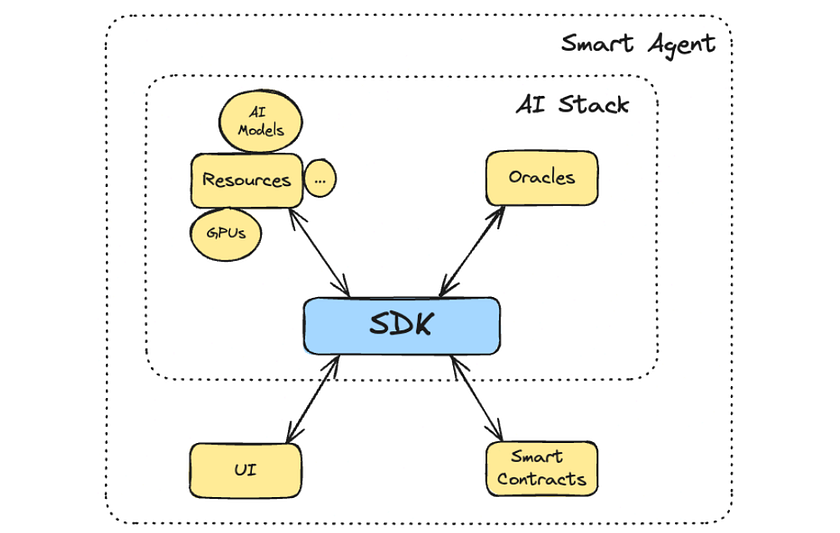“Smart agents are revolutionizing blockchain technology. Learn how Talus Network uses AI-driven decentralized agents to enhance blockchain efficiency, security, and transparency.”
Introduction
Talus Network is pioneering the integration of AI smart agents with blockchain technology. By leveraging decentralized, autonomous agents, Talus enhances key blockchain functions such as portfolio management, security, and governance. These AI agents operate within a transparent, verifiable system, using the blockchain to ensure trust and efficiency.
Smart Agents and Blockchain Integration
Smart agents are intelligent, autonomous programs that operate without human intervention, using AI technologies like machine learning to make decisions, learn from their environment, and optimize their actions. Imagine a smart agent as a personal assistant that manages tasks such as data analysis, contract execution, or even resource allocation. For instance, in a decentralized finance (DeFi) ecosystem, a smart agent might automatically rebalance a portfolio based on market conditions, ensuring optimal returns with no manual input.
When paired with blockchain, smart agents gain even more power. Blockchain’s decentralized and immutable nature provides a secure and transparent environment where agents can perform tasks like validating transactions, executing smart contracts, or managing assets. Because the blockchain ledger is public and verifiable, any action taken by a smart agent is transparent and can be audited by anyone.

In addition to these transactions, Talus supports complex interactions through specialized user interfaces and oracles, all accessible via the SDK. What truly sets Talus apart is the ability of smart agents to communicate with one another, allowing for compositional behaviours and social interactions at various granular levels, enhancing the collaborative potential of these agents across the ecosystem.
SDK
An SDK (Software Development Kit) is a set of tools and libraries that developers use to build applications for specific platforms or services. In the case of Talus, the SDK enables developers to easily interact with the Talus network.
Native AI Standards in Talus
In the context of Talus, “native” AI refers to AI systems that are specifically designed to operate seamlessly within a decentralized, blockchain-based environment. Unlike traditional AI models, which may run on centralized servers or be restricted to specific platforms, native AI in Talus is built to work directly with the blockchain.
For example, a traditional AI might analyse data and offer insights, but the results could be influenced by centralized decision-making or vulnerable to tampering. In contrast, Talus’ native AI is autonomous and operates on the blockchain, where every action it takes — such as executing smart contracts or verifying transactions — can be audited and verified by anyone in the network. This ensures that AI agents in Talus work according to predetermined, transparent rules without external interference.
By integrating AI directly with blockchain, Talus offers an AI experience that is both decentralized and trustless, providing more reliability and accountability compared to conventional AI systems, which often rely on central authorities or closed systems. An AI smart agent that handles the governance of a decentralized autonomous organization (DAO) — it would use the blockchain to verify every vote, action, and decision in a fully traceable manner, ensuring complete trust within the community.

AI-Driven Security
AI agents in Talus act as security system in the blockchain, constantly monitoring the blockchain for suspicious activities like large, unexpected transactions or repeated failed login attempts. When something unusual is detected, they can either block it or alert the system for investigation.
These agents can also communicate with each other, sharing information and collaborating to address threats. This allows them to act together, preventing fraud, isolating risks, or strengthening defences in real time — like a network of intelligent security guards working seamlessly to keep everything secure.
Conclusion
In conclusion, Talus is reshaping decentralized digital ecosystems by integrating AI with blockchain. Its high-throughput blockchain, combined with a native AI stack, addresses critical challenges like privacy, security, and accessibility. Talus’ decentralized platform enables transparent, efficient AI interactions, expanding AI’s potential across industries. With smart agents, interoperability protocols, and a focus on scalability and user-centric services, Talus sets a new standard for decentralized applications. This vision invites global collaboration to build a more equitable, autonomous digital future where AI and blockchain create limitless possibilities.


Leave a Reply